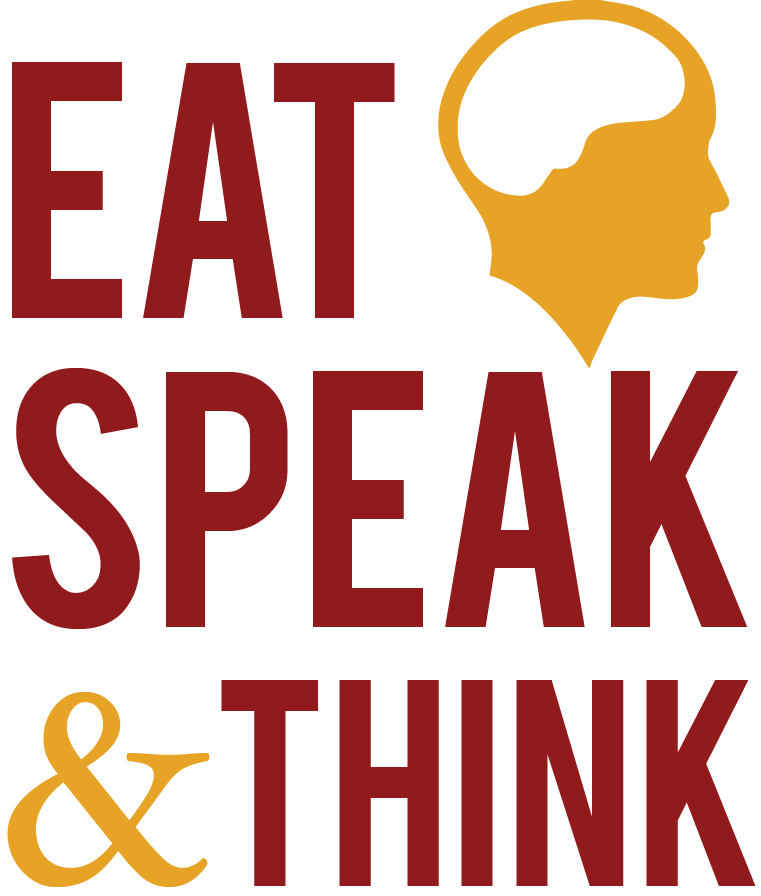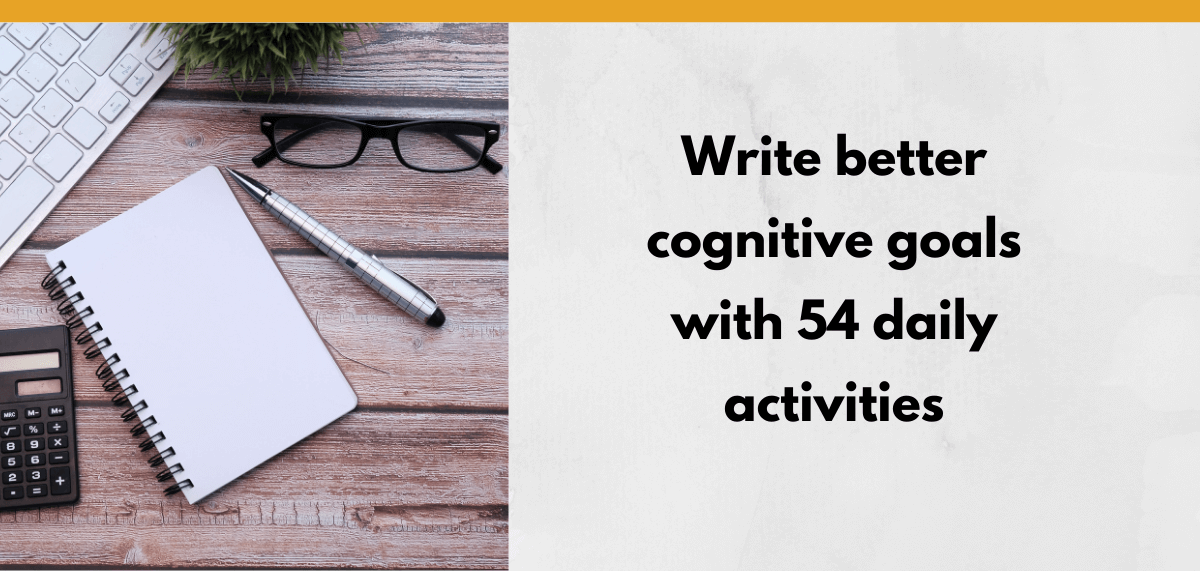Write better cognitive goals by working with your patient to identify the real-life skills and activities they want to improve with speech therapy. Here are 54 ideas for cognitive therapy, which are also listed on the two-page checklist you can give your patients. You and your patient can use the checklist to identify specific problem areas they would like to address in therapy. Thank you to Katie (SLP) for the idea of making a checklist!
Free DIRECT download: 54 daily activities checklist (patient handout). (Email subscribers get free access to all the resources in the Free Subscription Library.)
Outline:
- YouTube overview and tips.
- Clock and calendar.
- Medications.
- Bills and checkbook.
- Telephone.
- Smart phone.
- Computer.
- Mail.
- Office.
- Remembering information.
- Learning and using new procedures.
- Wayfinding.
- Having a conversation.
- Write better cognitive goals with MedBridge courses.
- Related Eat, Speak, & Think posts.
YouTube video and tips
I share a quick overview of the checklist and share my best tips for using it during assessment.
Clock and calendar
Understanding and using a clock and calendar are important skills to maintain independence. Here are six possible goal areas:
- Telling time.
- Understanding a calendar.
- Knowing the day of the week, date, or year.
- Keeping track of appointments.
- Planning your time.
- Completing planned tasks and activities.
Medications
Errors in taking medication, side-effects, and allergic reactions can be very serious and costly. Here are four skill areas that your patient may want to improve:
- Know the reason for each medication.
- Remember to take them.
- Managing the process of refilling the prescriptions.
- Actually swallowing the pills.
Bills and checkbook
Cognitive or language impairment can limit a person’s ability to manage their own finances. Here are five ideas to target in therapy:
- Understanding bills and other paperwork.
- Understanding money.
- Writing out checks.
- Paying bills on time.
- Balancing the checkbook.
Telephone
Being able to communicate by telephone is an important skill for safety, independence, and daily communication needs. Here are ideas for three skills to address:
- Making phone calls.
- Having a conversation.
- Checking voice mail.
Smart phone
More and more people are getting smart phones, which offers many tools that support communication and independent living. Here are six ideas for therapy:
- Making phone calls.
- Checking voice mail.
- Email.
- Social media.
- Using the internet.
- Calendar/alarms/other app.
Computer
Many people have difficulty using a computer after acquiring a cognitive or language impairment. Here are three common tasks people may wish to improve:
- Email.
- Social media.
- Using the internet.
Ever walk into someone’s home and find stacks of mail piled up? Dealing with the mail can be overwhelming, especially if someone has been in the hospital or in-patient rehab for a long period of time.
Coming up with a plan for simply working through it takes good executive function skills. In addition, a person may have a cognitive or language impairment that may limit their ability to understand and respond effectively.
Here are two skill areas your patient may wish to address in therapy:
- Reading and understanding the mail.
- Responding appropriately.
Office
Life means paperwork and lots of information to keep track of. Your patient may not have a good system for organizing and finding information. You may wish to address the following in therapy:
- Organizing paperwork.
- Finding information.
Remembering information
Trouble remembering information is a common complaint. Here are eight specific ideas for therapy that your patient may relate to.
- Names.
- Dates.
- Events.
- Addresses/phone numbers.
- Where things are located.
- Details of conversations.
- New instructions.
- Information that is read or heard.
Learning and using new procedures
When someone has a cognitive or language impairment, they often have trouble learning and remembering to use new procedures. Here are five skill areas you and your patient may wish to consider:
- Using a memory support tool.
- Learning to use a new device.
- Remembering to use a device.
- Using a cane or walker safely.
- Changing how one eats or drinks.
Wayfinding
When a person moves to a new location, such as an independent living facility, they may have difficulty learning where things are located. Here are six ideas to consider for therapy:
- Dining room.
- Mailbox.
- Laundry room.
- Trash/recycling room.
- Wellness center.
- Activity room.
Having a conversation
Successfully participating in a conversation requires skills beyond putting ideas into words. Here are four ideas for therapy:
- Starting a conversation.
- Staying on topic.
- Keeping a conversation going.
- Remembering the details later.
Write better cognitive goals with MedBridge courses
When we focus on practical skills and strategies, we can help our patients improve their lives in a real, meaningful way. Learn how to better cognitive goals by identifying meaningful and relevant therapy targets with these MedBridge courses taught by SLP Sarah Baar:
- Why and How to Practice Real-Life Activities in Speech Therapy*.
- Creating Functional Home Programs in Adult Rehab*.
- Close the Game Closet: Evidence and Tools for a Person-Centered Approach for Treatment of Adult Neurogenic Disorders*.
*This is an affiliate link. At no extra cost to you, you can help keep Eat, Speak, & Think sustainable if you subscribe through this link or use the code EatSpeakThink. Learn more about the discount.
Related Eat, Speak, & Think posts
- How to improve short term memory.
- How to plan cognitive therapy with 6 questions.
- How to use spaced retrieval with errorless learning to improve memory.
- 4 steps for using a calendar for meaningful language and cognitive-communication therapy.
Free DIRECT download: 54 daily activities checklist (patient handout). (Email subscribers get free access to all the resources in the Free Subscription Library.)
Featured image by towfiqu barbhuiya on Canva.com.
Lisa earned her M.A. in Speech-Language Pathology from the University of Maryland, College Park and her M.A. in Linguistics from the University of California, San Diego.
She participated in research studies with the National Institute on Deafness and other Communication Disorders (NIDCD) and the University of Maryland in the areas of aphasia, Parkinson’s Disease, epilepsy, and fluency disorders.
Lisa has been working as a medical speech-language pathologist since 2008. She has a strong passion for evidence-based assessment and therapy, having earned five ASHA Awards for Professional Participation in Continuing Education.
She launched EatSpeakThink.com in June 2018 to help other clinicians be more successful working in home health, as well as to provide strategies and resources to people living with problems eating, speaking, or thinking.



[…] EatSpeakThink.com’s “Write Better Cognitive Goals With 54 Daily Activities.” SLPs can improve goal-writing by identifying real-life skills and activities to improve upon in cognitive-communication treatment. If clinicians subscribe (for free), a two-page checklist to provide to patients to identify specific problem/goal areas is available. […]